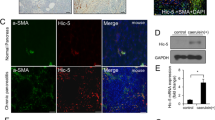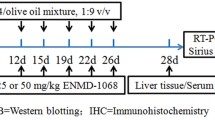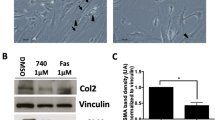Summary
To determine the biological effects of extracelluar signal regulated kinase (ERK) specific inhibitor PD98059 on pancreatic stellate cells (PSCs) activated by platelet-derived factor-BB (PDGF-BB), cultured rat PSCs were co-incubated at 37°C for 24 h with 25 ng/ml PDGF-BB and different doses of PD98059 (ranging from 5 ng/ml to 40 ng/ml). Expression ofpERK1 protein was detected by Western blot and collagen α1 (I) mRNA was tested by reverse transcription-polymerase chain reaction (RT-PCR). Our results showed that there were statistical differences in the expression ofpERK1 protein in all groups. Expression ofpERK1 protein was up-regulated in the group treated by PDGF-BB, and gradually down-regulated in the other groups treated by PD98059 of different doses. An excellent positive correlation was revealed between the inhibitory effect and PD98059 concentrations. It was also observed that the expression of collagen α1 (I) mRNA had similar response topERK1. The level of collagen α1 (I) mRNA was the highest in the PDGF-BB group, and gradually reduced in the other groups treated by PD98059 of different doses. It is concluded that expression ofpERK1 protein and collagen α1 (I) mRNA was up-regulated in rat PSCs activated by PDGF-BB. Meanwhile, PD98059 could inhibit PSCs activation mediated by PDGF. It is suggested that ERK1 protein plays an important role on PSCs activation mediated by PDGF signal pathway.
Similar content being viewed by others
References
Bachem M, Schneider E, Grobe Het al. Identification, culture and characterization of pancreatic stellate cells in rats and humans. Gastroenterology, 1998, 115:421
Haber P S, Keogh G W, Apte M Vet al. Activation of pancreatic stellate cells in human and experimental pancreatic fibrosis. Am J Pathol, 1999, 155:1087
Apte M V, Haber P S, Darby S Jet al. Pancreatic stellate cells are activated by proinflammatory cytokines: implications for pancreatic fibrogenesis. Gut, 1999, 44:534
Safadi R, Friedman S L. Hepatic fibrosis-role of hepatic stellate cell activation. Med Gen Med. 2002, 15:4 (3):27
Mann D A, Smart D E. Transcriptional regulation of hepatic stellate cell activation. Gut, 2002, 10(6):891
Gressner A M, Weiskirchen R, Breitkopf Ket al. Roles of TGF-beta in hepatic fibrosis. Front Biosci, 2002, 7:d793
Phillips P A, McCarroll J A, Park Set al. Rat pancreatic stellate cells secrete matrix metalloproteinases: implications for extracellular matrix turnover. Gut, 2003, 52:275
Luttenberger T, Schmid-Kotsas A, Menke Aet al. Platelet-derived growth factors stimulate proliferation and extracellular matrix synthesis of pancreatic stellate cells: implications in pathogenesis of pancreas fibrosis. Lab Invest, 2000, 80:47
Claesson-Welsh L. Platelet-derived growth factor receptor signals. J Biol Chem, 1994, 269:32023
Author information
Authors and Affiliations
Additional information
WAN Yuantai, male, born in 1964, Associate Profssor M. D., Ph. D.
Rights and permissions
About this article
Cite this article
Yuantai, W., Tiancai, W. & Qiu, Z. PD98059 inhibited the activation of pancreatic stellate cells mediated by platelet-derived growth factor BB in rats. Current Medical Science 25, 297–299 (2005). https://doi.org/10.1007/BF02828148
Received:
Published:
Issue Date:
DOI: https://doi.org/10.1007/BF02828148




